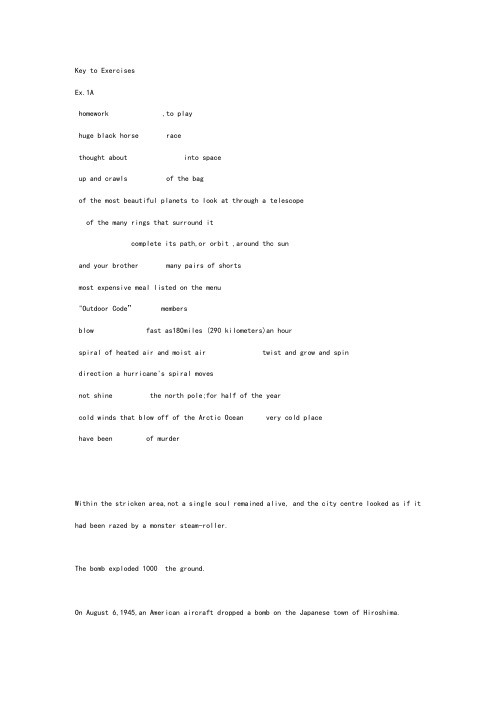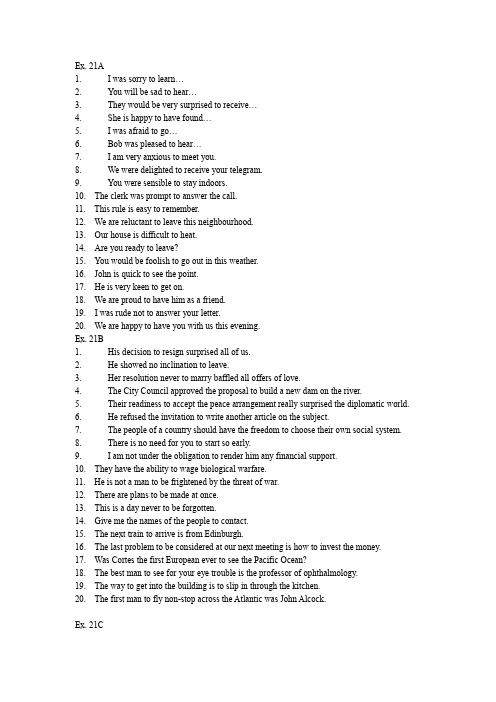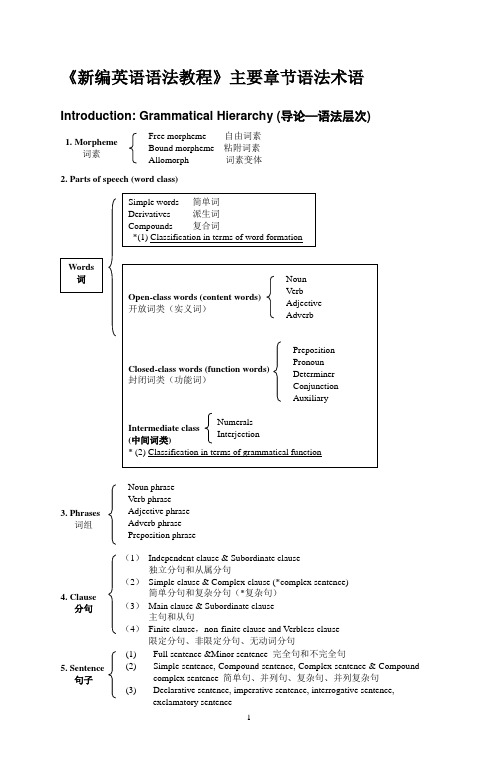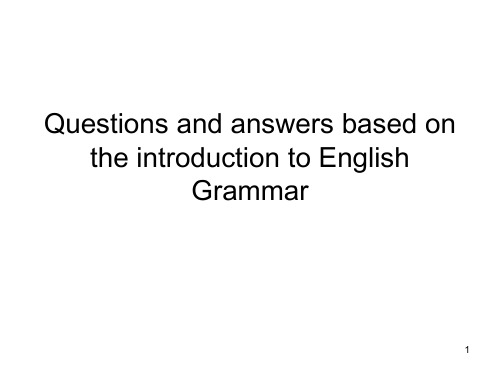新编英语语法教程第21讲
新编英语语法教程Subjunctive Mood

V. past perfect form SM
“would / should + have done”
1. supposition of a past situation a. If I had not seen it with my own eyes, I
would not have believed it. If he had received the present, he should have thanked her. If it hadn’t been for their support, we could not have won the election. ==how to make it inverted?
She is very pleased that all her students should pass the exam.
He regrets that he should have told lies to his good friend.
I wonder that she should love a man twenty years older than she.
“I don’t mind your old age and ugliness,” she added.
“God bless me!” replied the famous writer. “But how so?”
“If we could combine,” explained the actress, “our child would have my appearance and your brains and that would be perfect.”
《新编英语语法教程》(章振邦版)答案

《新编英语语法教程》(章振邦版)答案《新编英语语法教程》答案新编英语语法教程第29讲练习参考答案Ex. 29A1. It is possible that the Joneses will come to the party as well.2. It doesn’t matter very much whether they will come or not.3. It is quite likely that he will let you down.4. It seems that you have taken a dislike to him.5. It happens that I have had some nasty experiences in dealing with him.6. It was rather complicated getting the car on the boat.7. It would be a good idea to get up a petition. / I think it a good idea to get up a petition.8. It is a great pleasure to be here with you this morning.9. It was so kind of you to invite us. 10. It doesn’t matter in the least what you say. 11. It is / remains a mystery how he came to have such a valuable painting. 12. It is regretted that you should feel obliged to resign at this point. 13. It would be pity to spoil such a fine drawing. 14. It makes me feel sad seeing you sitting here all alone. 15. Is it very dull living here?/ do you find it very dull living here? 16. It is impossible for me to forgive him.17. It was not known whether there was gold left in the mine. 18. It looks as if the park is very small. 19. It seems as though our plan is perfect. 20. It was clearly indicated that he didn’t want to speak to me.Ex. 29B1. It gets dark early in winter.2. Its no use asking her. She doesn’tknow anything. 3. Its two miles to the station from here.4. Have you seen it hail?5. We leave it to you to decide what must be done.6. It is said that the spy slipped arsenic into his tea.7. It’s a pity (that) you missed that concert. 8. It looks as if he were very afraid. 9. It is no use crying over spilt milk.10. It was several months before we met again.Ex. 29C1. 迟早我要跟他说个明白。
《新编英语语法教程》PPT课件

Special lecture notes
Ù 6.月球上没有水。
Special lecture notes
Ù A: There is no water on the moon.
Ù 7. 夏威夷气候从来不冷. Ù A: It is never cold in Hawaii.
Ù 8. 在巴黎,五月份天气并非总是美好;有时多雨。 In Paris, the weather is not always nice; it rains a lot
的从句当中
Ù They were leaving a few days later.
Ù He told me to wake him up if he was sleeping. Ù 4) 表示现在时间和将来时间里的动作 Ù A) 委婉的语气
Ù I was wondering if you’d like to come out with me. Ù B) 主观臆想
Ù I hear poor old Mrs Yang has lost her son.
Ù 附特殊用法: Ù A) 表达某种情绪
Special lecture notes
Ù I happen to drop in on her once and you make such an issue of it.
Ù A:
Ù 15. 星M期y p日ar我ent父s se母ldo很m少go去to做ch礼urc拜h o.n Sunday.
Ù A: Ù 16. 地T球he 围Ear绕th太mo阳ve转s ar.ound the Sun.
Ù A:
India lies to the south of China.
18. 泰晤士河流经伦敦。
第五版大学新编英语语法教程答案

Key to ExercisesEx.1Ahomework ,to playhuge black horse racethought about into spaceup and crawls of the bagof the most beautiful planets to look at through a telescopeof the many rings that surround itcomplete its path,or orbit ,around thc sunand your brother many pairs of shortsmost expensive meal listed on the menu"Outdoor Code” membersblow fast as180miles (290 kilometers)an hourspiral of heated air and moist air twist and grow and spindirection a hurricane's spiral movesnot shine the north pole;for half of the yearcold winds that blow off of the Arctic Ocean very cold placehave been of murderWithin the stricken area,not a single soul remained alive, and the city centre looked as if it had been razed by a monster steam-roller.The bomb exploded 1000 the ground.On August 6,1945,an American aircraft dropped a bomb on the Japanese town of Hiroshima.Three days later,yet another bomb of the same kind gave the town of Nagasaki the same fatal Blow.The explosion made one and a half square miles of the city an expanse of reddish rubble.Within the fraction of a second,the bomb changed from a metalcylinder into an immense mass of expanding gas, millions of degrees hot.A tremendous blast of hot air whirled the debris of stone, concrete,metal,and wood over the ground. Ex.1CPond,once praised by Thoreau for its natural beauty,is now the site of many tourist stands. every summer night the cooling northeast wind swept through our bedroom windows, making air conditioning unnecessary and a light blanket welcome./Sweeping through our bedroom windows almost every summer night ,the cooling northeast wind made air conditioning unnecessary and a light blanket welcome.steep surrounding slopes were capped with snow, which fed two streams plunging down to join in the valley below.the river on one side and a large tree providing shade, this is a good spot for a picnic,and we can spread our blanket on the grassy knoll.for breath after running up the stairs, Mr Wood stood at his neighbour's door and knocked again and again till someone opened it.town folk envied Horace,who had come into a small fortune with which he bought a big house and obtained a partnership in the biggest grocery in town.in front of the mirror, Jim looked at his image, wondering at the big change that had come over him in recent years.idea that his only daughter whom he had greatly wronged might never forgive him almost drove him mad.story,written in plain language,consists of three parts with an interesting plot centering roundan aristocratic family living in 17th-century France.and shivering,John sat hunched over a bowl of hot broth prepared by his father to drive off the chill.above the waters of a beautiful lake and over thc tops of the tall pine trees growing on the steep slopes of a hill stand five Chinese-style pavilions.down the street, the old man stopped and leaned against a lamp-post,listening to a cheerful song coming out of a restaurant on the opposite side of the street.sank in the nearest chair,completely exhausted,her limbs stiff with cold,her mind a piece of blank.the day Mrs Rymer behaved very properly,her pleasant,refined face wearing a grave look,her elegant figure wrapped in deep mourning while occasionally she uttered a sigh or a sob.thought it necessary to break the news to his family, that Mr. Jacob,his former employer, had promised him a half-day job at 20 pounds a week.thought that he might have wronged his friend who had rendered him good services on many occasions troubled his mind,already overburdened with worries and cares.men of the disbanded royal bodyguard, suddenly turned loose onto the street of a capital seething with unrest,unemployed and perhaps disgruntled at their abrupt dismissal ,were a potentially dangerous clement.many years London has been a business centre with hotel accommodation for visiting businessmen together with well-to-do travellers but completely inadequate for the swarms of short-stay tourists landing at Heathrow or disembarking at Dover.the top, he climbed recklessly faster and faster, his eyes already glowing with triumph, but suddenly he slipped and fell, tumbling to the ground and lying motionless there, a crumpled pile of arms and legs.Russell was one of the very few persons who have received both the Order of Merit , which was conferred on him by the British government in 1949, and the Nobel Prize for literature, conferred in Norway in 1950.Ex.2A1. come2. are have 4. are 5. are 6. are 7. was/were 8. is 9. costs 10. were 11. are 12. are 13. was 14. are 15. lie 16. were 17. are 18. is 19. is 20. was 21. Has 22. were 24. is 25. are 26. is 27. are 28. cover, are 29. is/ are 30. was/were2. have3. is,is4. was5. were6. is 8. are 9. is 10. are, are 11. have 12. are, their, their 13. was, It, was 14. It/ They , is/ are 15. are, their, they, disapprove 16. were, they 17. was 18. are 19. were 20. wereEx.3A1. is2. was3. is4. has5. were6. means7. is8. is9. is 10. is 11. were 12. sells 13. is 14. are 15. are 16. are 17. is 18. is 19. was 20. provides 21. are 22. was 23. stops 24. is 25. is 26. does 27. produces 28. is 29. is 30. was1.’s2. are3. is4. are5. is6. was7. is8. were9. is 10. ’s 11. is 12. is,is,is 13. are 14. is 15. have 16. is 17. are 18. looks 19. are 20. are 21. understand 22. has 24. have 25. was 26. was 27. are 28. is 29. is 30. was 31. is 32.is/ are 33. leaves 34. is/are 35. are 36. are 37. is 38. comes 39. is 40. live 41. are 42. points/point 43. are 44. is 45. are 46. was 47. is/are 48. is 49. has 50. wasEx.3C1. is/are2. is/are3. is4. is/are5. is/are6. remain7. is8. are9. has/have 10. care/cares 11. is 12. plays 13. is 14. am 15. are/is 16. was 17. is, has 18. was 19. come 20. isEx.4A1. description2. arrangement3. attendance4. peculiarity5. expectation6. argument7. dependence8. originality9. exaggeration 10. measurement 11. purity 12. persistence 13. extension 14. statement 15. generosity 16. entrance 17. loneliness 18. forgetfulness 19. happiness 20. seriousness1.strange sounds2.foods are3.chiefs,tribes,their,salmon(s)4.The runners-up were given pound notes\The runners-up were each given a pound note.5.bodies,their heroes6.mice,tooth-marks7.Crises,occur,families8./9./10.these businesses11./12.fruits are13./14.these articles are well written15./16.several personal kindnesses17./18.sufferings19.professors20.children are playing,sandsEx.4Cadvice important piece ofinformationit is fun not numerousarehastimes,rivalry ,wereisisswarmEx.5A1.my father has a car2.the bull has horms3.the prisondr escaped4.her parents consentedreleased the prisonerassassinated the Presidentletter from the general / the general sent a lettercrowd felt sympathycollege for womensummer day, a day in the summerearth has a (rough) surfaceabsence lasted ten daysdoctoral degree , a doctoratebird made the nestcommittee made a reportstory told by the girl / the girl told a storyvolcano eruptedvictim had courage / the victim was courageouspunished the boycritics received the play in a hostile manner1.The comedian performed , and he was well received by a huge audience.这位喜剧演员的演出很受广大观众的欢迎。
(完整版)新编英语语法教程第21讲

Eg:
A person certainly loses when he gives up trying.
Plus, who can resist starting the day with chocolate.
I don’t want to miss seeing that film on television tonight.
21:--- ING Participle
Hey:
we are team 6 ~
We want to tell you :
因为我人们这组的内容非常的少,为了让每个 人都拥有展示自己的机会
所以嘞~ 我们将内容分成了两个部分 ----- 六位同学讲解书本上得语法知识 ----- 两位同学专门讲解题目(因为题目很多) So : 我们八位都参加了活动哦~
eg:
She insisted on me going. 解析: 在这一例中,going的主语是me, 如果略去了me,那就成了“她坚持要去”, 而不是“她坚持要我去”了
• -ing分词的逻辑主语既能采用名词通格和 名词属格形式,也能采用代词宾格和物主 限定词形式。eg:
John
– I don’t mind { John’s } buying another one.
“to” and “about”.
trick mislead shame surprise
talk beguile blackmail cajole coerce
fool deceive
+ sb + into +doing
His mother tricked him into doing homework by pretending that she would tell his father.
新概念第二册21课被动语态

主动语态变为被动语态时注意
1. 含直接宾语和间接宾语的主动语态变 为被动语态时有两种情况: 2. Eg He gave the boy an apple. → • (1)把间接宾语改为主语,直接宾语保 留不变:
• The boy was given an apple
•
•
•
(2)把直接宾语改为主语,此时,间接 宾语前要 加to或for.
过去 时,含情态动词的被动语态
1. A man killed Jack. → Jack was killed (by a man).
1. Han Mei found Granny’ books. → Granny’ books were found by Han Mei.
2. They built the bridge. →
主动语态改为被动语态的方法
将主动语态的宾语改为被动语态的主语。 将主动语态的谓语动词改为“be+过去分词” 结构。 将主动语态的主语改为介词 by之后的宾语, 放在谓语动词之后(有时可省略)。
将下列句子改成被动语态。 1.We use English as a foreign language. →
二.模仿上列子连词成句
1. 2. 3. 4. 5. 6. Silk, produce, in Hangzhou. Cars, make, in Tianjin. tea, grow, in Fujian. English, speak, in Australia. Glass, produce, in Germany. Ships, make , in Japan.
3 某些动词表被动含义如 weigh / measure / cost / last / break out / take place /happen
《新编英语语法教程》(第6版)答案21

Ex. 21A1. I was sorry to learn…2. You will be sad to hear…3. They would be very surprised to receive…4. She is happy to have found…5. I was afraid to go…6. Bob was pleased to hear…7. I am very anxious to meet you.8. We were delighted to receive your telegram.9. You were sensible to stay indoors.10. The clerk was prompt to answer the call.11. This rule is easy to remember.12. We are reluctant to leave this neighbourhood.13. Our house is difficult to heat.14. Are you ready to leave?15. You would be foolish to go out in this weather.16. John is quick to see the point.17. He is very keen to get on.18. We are proud to have him as a friend.19. I was rude not to answer your letter.20. We are happy to have you with us this evening.Ex. 21B1. His decision to resign surprised all of us.2. He showed no inclination to leave.3. Her resolution never to marry baffled all offers of love.4. The City Council approved the proposal to build a new dam on the river.5. Their readiness to accept the peace arrangement really surprised the diplomatic world.6. He refused the invitation to write another article on the subject.7. The people of a country should have the freedom to choose their own social system.8. There is no need for you to start so early.9. I am not under the obligation to render him any financial support.10. They have the ability to wage biological warfare.11. He is not a man to be frightened by the threat of war.12. There are plans to be made at once.13. This is a day never to be forgotten.14. Give me the names of the people to contact.15. The next train to arrive is from Edinburgh.16. The last problem to be considered at our next meeting is how to invest the money.17. Was Cortes the first European ever to see the Pacific Ocean?18. The best man to see for your eye trouble is the professor of ophthalmology.19. The way to get into the building is to slip in through the kitchen.20. The first man to fly non-stop across the Atlantic was John Alcock.Ex. 21C1. Environmental pollution is a hard problem to be coped with.2. There is no time to lose. We must start at once.3. This is an infectious disease to be wiped out in a few years.4. There was no sound to be heard.5. I’ve spent two days here. There is nothing to see.6. This is a good book in which there is much to be learnt.7. This is an item of information not to say to any other people.8. This is a difficult question to answer.9. At the sound of footsteps outside the window, I stole out of the room, but there was nothing to be seen.10. He is a man to be reckoned with.11. She was firm in her refusal to accept his offer of marriage.12. I have accepted the invitation to go to their school for an exchange of experience.13. I need a box to hold the chessmen.14. What is there to be proud of?15. He always thinks that the bed is a good place to read detective stories.16. Every day I have a lot of question to consider.17. The only way to deal with her is not to give an inch.18. She is not a woman to be trifled with.19. My brother was the third person to be interviewed.20. You have left me very little to say.Ex. 21D1. …supposed her to be a widow.2. …felt the plan to be unwise.3. …admit him to be a genius.4. …declared the book to be obscene.5. …found the overhead projector to be invaluable as a teaching aid.6. …thought the film to be highly original.7. …conside red the speaker to have overstated his case.8. …showed the man’s alibi to be a complete fabrication.9. …assumed the construction of such a building to be impracticable whereas…believed it to be perfectly feasible.10. …revealed himself to b e a master of the keyboard.11. …knew him to be a man of integrity.12. …discovered £20,000 worth of precious stones to be missing.13. …thought it to be impossible…14. …understands it to be impossible…15. …acknowledge many of their predictions to have been over-optimistic.16. …that their informant was reliable.17. …that the situation is now under control.18. …that it was unlikely…19. …that it was cruel…20. …that what he said was based on fact.21. …that it was likely…22. …that his long-term optimism was justified.23. …that his party has little chance of…24. …that the ascent had taken nearly five and a half hours.25. …that his evidence had been perjured.26. …that earlier theories were incorrect.27. …the gain in reserves was / has been…28. …knowing that they had been stolen.29. …that their candidate was unacceptable to them.30. …that its implementation was desirable.Ex. 21Ea) 1. so that it should / might look2. so that there should be3. so as not to get4. so as not to leave5. so that the room should look6. so as to avoid7. so as to have8. so that we should not have9. so as to have10.So that I should not have11.so that it should not get12.so that it should be13.so as not to get14.so as to cover15.so that my arms should not get16.so as not to get17.So that the brush should not get18.so that it may / can be used19.so that it shall not get 20.so as to useb)1. so kind as to invite2. so (that) I was3. so happy that I danced4. to get5. so unfortunate as not to have6. for the snow to be7. so thick as to cover8. cold enough to freeze9. so (that) I had10.so kind as to send11.for it to arrive12.too excited to untie13.so (that) I cut14.for me to wear。
新编英语语法教程1-18讲参考答案---上外第五版

《新编英语语法教程》1-18讲参考答案新编英语语法教程第01讲练习参考答案Ex. 1A1. A. his home workB. quickly, to play2. A. The huge black horseB. the race3. A. have thought aboutB. going into space4. A. warms up and crawlsB. out of the bag5. A. one of the most beautiful planets to look at through a telescopeB. because of the many rings that surround it6. A. 165 yearsB. to complete its path, or orbit,around the sun7. A. you and your brotherB. How many pairs of shorts8. A. the most expensive meal listed on the menuB. What9. A. an “Outdoor Code”B. their members10. A. can blowB. as fast as 180 miles (290 kilometers) an hour11. A. The spiral of heated air and moist airB. to twist and grow and spin12. A. The direction a hu rricane’s spiral movesB. counterclockwise13. A. does not shineB. At the north pole: for half of the year14. A. The cold winds that blow off of the Arctic OceanB. a very cold place15. A. might have beenB. guilty of murderEx. 1B1. SVCWithin the stricken area, not a single soul remained alive, and the city centre looked as if it had been razed by monster steam-roller.2. SVThe bomb exploded 1,000 ft. above the groun.3. SVOOn August 6, 1945, an American aircraft dropped a bomb on the Janpanese town of Hiroshima.4. SvoOThree days later, yet another bomb of the same kind gave the town of Nagasaki the same fatal blow.5. SVOCThe explosion made one and a half square miles of the city an expense of reddish rubble.6. SV AWithin the fraction of a second, the bomb changed from a metal cylinder into an immense mass of enpanding gas, millions of degrees hot.7. SVOAA tremendous blast of hot air whirled the debris of stone, cencrete, metal, and wood over the ground. Ex. 1C1. Walden Pond, once praised by Thoreau for its natural beauty, is now the site of many tourist stands.2. Almost every summer night the cooling northeast wind swept through our bedroom windows, marking air conditioning unnecessary and a light blanket welcome. / Swepping through our bedroom windows almost every summer night, the cooling northeast wind made…3. The steep surrounding slopes were capped with snow, which fed two streams plunging down to join in the valley below.4. With the river on one side and a large tree providing shade, this is a good spot for a picnic, and we can spread our blanket on the grassy knoll.5. Panting for breath after running up the stairs, Mr wood stood at his neighbour’s doo r and knocked again and again till someone opened it.6. The town folk envied horace, who had come into a small fortune with which he bought a big house and obtained a partnership in the biggest grocery in town.7. Standing in front of the mirror, Jim looked at his image, wondering at the big change that had come over him in recent years.8. The idea that his only daughter whom he had greatly wronged might never forgive him almost drove hime mad.9. The story, written in plain language, consists of three parts with an interesting plot centering round an aristocratic family living in 17th century France.10. Mud-covered and shivering, John sat hunched over a bowl of hot broth prepared by his father to drive off the chill.11. Far above the waters of a beautiful lake and over the tops of the tall pime trees growing on the steep ofa hill stand five Chinese-style pavilions.12. Farther down the street, the old man stopped and leaned against a lamp-post, listening to a cheerful song coming out of a restaurant on the oppsite side of the street.13. Sarah sank in the nearest chair, completely exhausted, her limbs stiff with cold, her mind a piece of blank.14. Throughout the day Mrs Rymer behaved very properly, her pleasant, refined face wearing a grave look, her elegant figure wrapped in deep mourning while occasionally she uttered a sigh or a sob.15. Tony thought it necessary to break the news to his family, that Mr Jacob, his former employer, had promised him a half-day job at 20 pounds a week. 16. The thought that he might have wronged his friend who had rendered him good services on many occasions troubled his mind, already overburdened with worries and cares.17. The men of the disbanded royal bodyguard, suddenly turned loose onto the street of a capital seething with unrest, unemployed and perhaps disgruntled at their abrupt dismissal, were a potentially dangerous element.18. For many years London has been a business centre with hotel accommadation for visiting businessmen toghter with well-to-do travellers but completely inadequate for the swarms of shour-stay tourists landing at Heathrow or disembarking at Dover.19. Nearing the top, he climbed recklessly faser and faster, his eyes already glowing with triumph, but suddenly he slipped and fell, tumbling to the ground and lying motionless there, a crumpled pile of arms and legs.20. Bertrand Russell was one of the very few persons who have received both the Order of Merit, which was conferred on him by the British government in 1949, and the Nobel Prize for literature, conferred in Norway in 1950.新编英语语法教程第02讲练习参考答案Ex. 2A1. come2. are3. has / have4. are5. are6. are7. was / were8. is9. costs 10. were 11. are 12. are 13. was 14. are 15. lie 16. were 17. are 18. is 19. is 20. was 21. Has 22. were 23. is 24. is 25. are 26. is 27. are 28. cover, are 29. is / are 30. was/wereEx. 2B1. were2. have3. is, is4. was5. were6. is7. is8. are9. is 10. are, are11. have 12. are, their, their 13. was, It, was 14, It / They, is / are 15. are, their, they, disapprove 16. were, they 17. was 18. are 19. were 20. were新编英语语法教程第03讲练习参考答案Ex. 3A1. is2. was3. is4. has5. were6. means7. is8. is9. is 10. is 11. were 12. sells 13. is 14. are 15. are 16. are 17. is 18. is 19. was 20.provides 21. are 22. was 23. stops 24. is 25. is 26. does 27. produces 28. is 29. is 30. was Ex. 3B1. ’s2. are3. is4. are5. is6. was7. is8. were9. is 10. ’s 11. is 12. is, is, is 13. are 14. is 15. have 16. is 17. are 18. looks 19. are 20. are 21. understand 22. has 23. was 24. have 25. was 26. was 27. are 28. is 29. is 30. was 31. is 32. is / are 33. leaves 34. is / are 35. are 36. are 37. is 38. comes 39. is 40. live 41. are 42. points / point 43. are 44. is 45. are 46. was 47. is / are 48. is 49. has 50. wasEx. 3C1. is / are2. is / are3. is4. is / are5. is / are6. remain7. is8. are9. has / have 10.care / cares 11. is 12. plays 13. is 14. am 15. are / is 16. was 17. is, has 18. was 19. come 20. is新编英语语法教程第04讲练习参考答案Ex. 4A1. description2. arrangement3. attendance4. peculiarity5. expectation6. argument7. dependence 8. originality 9. exaggeration10. measurement 11. purity 12. persistence 13. extension 14. statement 15. generosity 16. entrance 17. loneliness18. forgetfulness 19. happiness 20. seriousness Ex. 4B1. strange sounds2. foods are3. chief, tribes, their, salmon (s)4. The runners-up were given pound notes / The runners-up were each given a pound note.5. bodies, their heroes6. mice, tooth-marks7. Crises, occur, families8. / 9. / 10. these businesses 11. / 12. fruits are13. / 14. these articles are well written 15. / 16. several personal kindnesses17. / 18. sufferings 19. professors 20. children are playing, sandsEx. 4C1. experience2. waters3. for advice4. an important piece of information5. for it is fun6. were not numerous7. Poultry8. directors are9. militia 10. geniuses 11. merchandise has 12. sympathies 13. experiences 14. were times, rivalry 15. clippings, were 16. lookers-on 17. foliage is 18. photos 19. 12-pages 20. Luggage isEx. 4D1. blade2. piece3. choir4. flash5. lump6. gang7. grain8. head9. staff 10. collection 11. fleet 12. cluster 13. bundle 14. bunch 15. team 16. piece 17. ear 18. bar 19. herd 20. pack 21. flock 22. crowd / swarm 23. troupe 24. bench 25. grove 26. collection 27. suite 28. squadron 29. band 30. libraryEx. 4E1-5 BCADC 6-10 CBDAB 11-15 ADBBC 16-20 BDCAB新编英语语法教程第05讲练习参考答案Ex. 5A1. my father has a car2. the bull has horns3. the prisoner escaped4. her parents consented5. somebody released the prisoner6. somebody assassinated the President7. a letter from the general / the general sent a letter8. the crowd felt sympathy9. a college for women10. a summer day, a day in the summer11. the earth has a (rough) surface12. the absence lasted ten days13. a doctoral degree, a doctorate14. the bird made the nest15. the committee made a report16. a story told by the girl / the girl told a story17. the volcano erupted18. the victim had courage / the victim was courageous19. somebody punished the boy20. the critics recevied the play in a hostile manner Ex. 5B1. The comedian performed, and he was well received by a huge audience.这位喜剧演员的演出很受广大观众的欢迎。
《英语语法》教学大纲

《英语语法(一)》教学大纲编写:张涛审核:一、课程性质与地位英语语法课是英语专业的一门必修课和专业基础课,该课程旨在帮助学生掌握全面、系统的英语语法知识,提高学生运用英语语法的能力,从而为听、说、读、写能力的全面提高打下坚固的基础。
二、课程教学目标1. 通过本课程的学习,让学生能够熟悉各种语法概念,掌握系统的英语语法知识;2. 让学生重点掌握英语语法的核心项目,提高学生在上下文中运用英语的准确性,借助语法知识解决英语学习中的有关问题;3. 提高学生连句成篇的能力,克服语篇写作中的语法问题,形成连贯、顺畅的语篇;4. 通过英语语法知识的系统学习和大量练习,让学生学会运用语法规则指导语言实践,提高学生的英语交际能力。
三、课程教学内容与要求导论——语法层次教学内容:1. 词素2. 词3. 词组4. 分句5. 句子教学要求:1. 了解:词素、词和各种词组。
2. 熟悉:各种分句。
3. 掌握:完全句和不完全句;简单句、并列句、复杂句和并列复杂句。
第1、2讲句子结构、主谓一致(一)教学内容:1. 主谓结构和句子分析2. 基本句型及其转换与扩大3. 主谓一致的指导原则4. 以-s结尾的名词做主语的主谓一致的问题5. 以集体名词做主语的主谓一致的问题教学要求:1. 了解:以-s结尾的名词做主语的主谓一致的问题;以集体名词做主语的主谓一致的问题。
2. 熟悉:主谓结构和句子分析;基本句型及其转换与扩大。
3. 掌握:主谓一致的指导原则。
第3、4讲主谓一致(二)、名词和名词词组教学内容:1. 以并列结构作主语的主谓一致问题2. 以表示数量概念的名词词组作主语的主谓一致问题(1)以表示确定数量的名词词组作主语(2)以表示非确定数量的名词词组作主语3. 其他方面的主谓一致问题4. 名词分类和名词词组的句法功能、名词的数、单位词教学要求:1. 了解:名词分类和名词词组的句法功能、名词的数、单位词。
2. 熟悉:以表示数量概念的名词词组作主语的主谓一致问题、其他方面的主谓一致问题。
新概念英语第二册:第21课课文详解及语法解析

新概念英语第二册:第21课课文详解及语法解析-CAL-FENGHAI.-(YICAI)-Company One1新概念英语第二册:第21课课文详解及语法解析课文详注 Further notes on the text1.I live near an airport and passing planes can be heard night and day. 我住在一个机场附近,过往飞机日夜不绝于耳。
(1)passing 是现在分词,作形容词用,表示“经过的”、“过往的”:He stopped a passing car.他挡住了一辆过往汽车。
He forgot the man with passing time.随着时间的消逝,他忘掉了那个人。
(2)night and day是固定短语,意为“日日夜夜”、“夜以继日”:He thought of the matter night and day.他日夜在想这个问题。
He worked night and day.他夜以继日地工作。
2.The airport was built years ago, but for some reason it could not be used then. 机场是很多年前建的,但因为某种原因当时未能启用。
(1)years 前面不加确定的数词时,一般表示“很多年”,weeks等的用法与它相似:He left the city years ago.他多年前就离开了这座城市。
I have not seen him for weeks.我已经有好几个星期没见他了。
(2)some 在这里不表示“一些”,而表示“某个”、“某种”等:I'll tell you someday.有一天我会告诉你的。
We'll talk about it some other time.我们改日再谈这件事。
3.…it came into use. ……机场开始使用了。
章振邦《新编英语语法》Lecture 21教学课件

新概念课程Lesson21讲解和译文

新概念课程Lesson21讲解和译文新概念课程Lesson21讲解和译文Lesson 21 William S. Hart and the early 'Western' film威廉.S. 哈特和早期限的‘西部’影片First listen and then answer the following question.听录音,然后回答以下问题。
How did William Hart's childhood prepare him for his acting role in Western films?William S. hart was, perhaps, the greatest of all Western stars, for unlike Gary Cooper and John Wayne he appeared in nothing but Westerns. From 1914 to 1924 he was supreme and unchallenged. It was Hart who created the basic formula of the Western film, and devised the protagonist he played in every film he made, the good-bad man, the accidental-noble outlaw, or the honest-but-framed cowboy, or the sheriff made suspect by vicious gossip; in short, the individual in conflict with himself and his frontier environment.Unlike most of his contemporaries in Hollywood, Hart actually knew something of the old West. He had lived in it as a child when it was already disappearing, and his hero was firmly rooted in his memories and experiences, and in both the history and the mythology of the vanished frontier. And although no period or place in American history has been more absurdly romanticized, myth and reality did join hands in at least one arena, the conflict between the individual and encroaching civilization.Men accustomed to struggling for survival against the elements and Indians were bewildered by politicians, bankers and businessmen, and unhorsed by fences, laws and alien taboos.Hart's good-bad man was always an outsider, always one of the disinherited, and if he found it necessary to shoot a sheriff or rob a bank along the way, his early audiences found it easy to understand and forgive, especially when it was Hart who, in the end, overcame the attacking Indians.Audiences in the second decade of the twentieth century found it pleasant to escape to a time when life, though hard, was relatively simple. We still do; living in a world in which undeclared aggression, war, hypocrisy, chicanery, anarchy and impending immolation are part of our daily lives, we all want a code to live by.【参考译文】威廉.S.哈特大概是美国西部电影明星中的佼佼者。
外教社新编英语语法教程(第6版)PPT课件Unit 21

“某些形容词+不定式结构” 作主语补语的歧义现象 P224
不定式 (二)
主—动关系、动—宾关系、 同位关系 P225
用主动态还是用被动态 P225
不定式与名词. 的搭配关系
“名词+不定式"与“名词+ 介词+ -ing分词” P226
不定式与动词 的搭配关系
动词+不定式 P228
动词+宾语+不定式 P228
主谓关系
He has a large family to support. (= that he must support) 动宾关系
He hit back the urge to tell a lie. (to tell a lie是the urge的具体内容) 同位关系
提示 表同位关系的名词中心词一般是由动词派生出来的抽象名词。
重难点解析
21.1 不定式与 21.2 不定式与 形容词的搭配 名词的搭配
21.3 不定式 与动词的搭配
21.4 不定式 分句
2. 表动宾关系时,如果不定式是不及物动词,其后需加适 当的介词
e.g. We are looking for a place to live in.
提示1 live为不及物动词,我们不能说to live a place,应该说to live in a place。
提示 动词为接双宾语的动词。
重难点解析
21.1 不定式与 21.2 不定式与 形容词的搭配 名词的搭配
21.3 不定式 与动词的搭配
21.4 不定式 分句
3 “名词 + 不定式”与“名词 + 介词 + -ing分词”
1. attempt, chance, effort, freedom, intention, necessity, opportunity, reason, time, way ...
《新编英语语法教程》主要章节语法术语

《新编英语语法教程》主要章节语法术语Introduction: Grammatical Hierarchy (导论—语法层次)2. Parts of speech (word class)3. Phrases词组4. Clause分句5. Sentence句子1. Morpheme词素Free morpheme 自由词素Bound morpheme 粘附词素Allomorph 词素变体Noun phraseVerb phraseAdjective phraseAdverb phrasePreposition phraseConjunctionLecture 1 Sentence Structure(L1)Sentence elements:S (subject) 主语V (predicate verb)谓语动词O (object)宾语C (complement)补足语A (Adverbial)状语1. Two ways of sentence analysis1) SVOSentenceClauseNP VP NPSubject Predicate verb ObjectAll the man have done their best.Sentence = Subject + Predicate (Predicate Verb + Object, Complement, Adverbial, etc.)●句子由主语和谓语构成,进一步把谓语剖析为谓语动词、宾语、补语、状语等。
2) Subject + Predicate (= operator + predication)SentenceClauseSubject PredicateOperator PredicationAll the man have done their best.●句子由主语和谓语构成,进一步把谓语剖析为操作词(operator)和述谓成分(predication)。
《新编英语语法教程》ppt课件

要
特征或所处的状态,即
动词性 “是什么”、“干什么”、 情态动词+原形动词
复合 复合谓语 “怎么样”
成谓
谓语 名词性
系动词+主语的表语(名词、
分语
复合谓语
代词、数词、形容词、副词、 介词短语、非谓语动词、从句)
双重谓语
由不及物动词+主语的 不及物动词come, go, leave,
表语构成,表现主语的 arrive, return, rise, die, live 等
3
Note 1: Single subject/predicate S–V and Compound subject/predicate (p.14)
S1: The boys and the girls are planning a dance.
S V
S
S4: Leah jumped on her bike and rode around the block.
介词+其补足成分
补 宾语补足语 补足直接宾语/主语的意义, 名词、形容词、副词、
要
足 主语补足语 使其完整,宾语/主语与其补 介词短语、不定式、
语
足语之间有逻辑主谓关系
分词、动名词
修饰或限定名词、代词,说 形容词、名词、代词、名
成
定语
明人或物的特性、状态、数 词所有格、数词、副词、
量等
不定式、动名词、分词、
Predicate verb Object (direct object, indirect object, complex object) Complement (subject complement, object complement)
章振邦《英语语法教程》教学大纲

章振邦《-英语语法教程》-教学大纲《英语语法》教学大纲课程编号:2152102课程类别:专业课学时:32学分:2.0适用专业:英语专业一年级先修课程:无一、课程性质、目的和任务《英语语法》为英语专业基础课,英语语法根据英语专业人才培养的要求,旨在对学生进行英语语法基本理论和基本技能的教育和培养。
通过本课程的学习,学生应具有基本的理论知识和应用能力,了解英语语法的一些基本知识与概念,了解英语语言的原理、规则与特点,熟练掌握常用的语法知识,语法体系,具备进一步学习英语语言与英语高级语法的基础,并能够在英语口语、阅读、写作、翻译等实际应用中正确使用英语。
课程任务是帮助学生重点掌握英语语法的核心项目,提高学生在上下文中恰当运用英语语法的能力和运用英语的准确性,使学生对英语语法有一个比较系统的了解并借助英语语法知识解决英语学习过程中的有关问题。
二、课程教学内容、要求1.课程教学内容语法层次;句子结构;主谓一致;名词和名词词组及属格;限定词;代词;动词和动词词组;动词的时和体;将来时间表示法;被动态;虚拟式;助动词;不定式;分词;独立结构;比较等级和比较结构;并列结构;从属结构;关系分句;倒装;省略;替代;语篇衔接2. 课程教学要求:1).精讲多练,注重实践2).以学生为中心组织教学3).注意培养语篇水平上应用语法知识的能力。
导论:语法层次第1讲:句子结构第2、3讲:主谓一致第4、5讲:名词、名词词组和名词属格第8、9讲:代词第10讲:动词和动词词组第11、12讲:动词的时和体第13讲:将来时间表示法第14、15讲:被动态第16讲:虚拟式第17、18讲:助动词第19、20讲:不定式第21、22讲:分词第23、24、25讲:形容词和形容词词组;副词和副词词组;比较等级和比较结构第26讲:介词和介词词组第27讲:陈述句、疑问句、祈使句、感叹句第28、29讲:存在句;IT-句型第30、31、32讲:并列结构,从属结构第33讲:关系分句第34讲:条件句第35讲:直接引语和间接引语第36讲:修饰第37、38讲替代和省略第39讲:后置、前置、倒装第40讲:从句到篇三、参考学时分配四、课程说明1. 本大纲依据兰州理工大学技术工程学院2014年英语专业本科人才培养方案编写。
- 1、下载文档前请自行甄别文档内容的完整性,平台不提供额外的编辑、内容补充、找答案等附加服务。
- 2、"仅部分预览"的文档,不可在线预览部分如存在完整性等问题,可反馈申请退款(可完整预览的文档不适用该条件!)。
- 3、如文档侵犯您的权益,请联系客服反馈,我们会尽快为您处理(人工客服工作时间:9:00-18:30)。
第21讲-ING分词本书所讲的-ing分词(-ING Participle)包括传统语法所指的“现在分词”(Present Participle)和“动名词”(Gerund)。
本讲主要介绍-ing分词与动词的搭配关系。
为了更好的说明问题,有必要以不定式的相应用法作比较说明。
21.1 -ing分词与动词的搭配关系本书介绍“动词+-ing分词”以及“动词+宾语+介词+-ing分词”这两种搭配关系。
1)能带-ing分词而不能带不定式的动词英语中有一些动词能带-ing分词结构而不能带不定式结构作宾语。
这类动词常见的有admit,acknowledge,anticipate,advocate,appreciate,Avoid,can’t help,can’t stand,consider,contemplate,defer,delay,deny,detest,dislike,don’t mind,ensure,enjoy,escape,excuse,evade,facilitate,fancy,favour,finish,give up,imagine,include,keep(on),mind,miss,pardon,postpone,practise,put off,resent,report,risk,stop,suggest等。
例如:I can not resist bargaining.Carlos just missed being caught.Please pardon my disturbing you.We appreciate your inviting us to your party.I hope you did not contemplate coming with us on this trip.She said she had always detested seeing a bullfight.They denied giving any further information to help the police.I hope that by posting the final xix pages now at mid-day I shall ensure your receiving them before the weekend proper.关于-ing分词的逻辑主语(Logical Subject),有三种情况:一种情况是,在特定的语境中,-ing分词的逻辑主语对于谈话双方是不言而喻的,因而无需表示出来。
例如:Father suggested going by bus.谁乘公共汽车去,有多少人去,去的人中是否包括父亲在内,这在特定的场合听话人是不会误解的。
第二种情况是,-ing分词的逻辑主语已在句中其他地方出现,因而也无需表示出来。
例如:.Would you mind ringing me up tomorrow?显然,这里-ing分词的逻辑主语就是主句的主语you。
第三种情况是,-ing分词本身带有自己的主语,因而必须表示出来。
这主要见于-ing分词的主语没有在句中其他地方出现过,如果不表现出来,往往回产生歧义。
例如:She insisted on me going.在这一例中,going的主语是me,如果略去了me,那就成了“她坚持要去”,而不是“她坚持要我去”了。
-ing分词的逻辑主语既能采用名词通格和名词属格形式,也能采用代词宾格和物主限定词形式。
例如:JohnI don’t mind John’s buying another one。
himhis在口语中倾向于用名词通格和代词宾格。
以上所列acknowledge,admit,advocate,anticipate,appreciate,deny,fancy,imagine,suggest,report以及mean(entail),mention,propose,recall,recollect,understand等动词,既能直接带-ing分词结构也能直接带that-分句。
例如:The watchman reported finding the door open。
The watchman reported that he had found the door open。
He anticipated getting much pleasure from the reading of that book。
He anticipated that he would get much pleasure from the reading of that book。
2)动词+宾语+介词+- ing分词有一些动词不能直接带-ing分词,而必须在动词之后加宾语再加介词,着才能带-ing分词。
在这里,常见的介词是into和from。
例如“动词+宾语+into+-ing分词”:He tricked her into marrying him by pretending that he was rich。
Don’t let his friendly words mislead you into trusting him。
I shamed him into returning the stolen money。
Her sudden question surprised him into betraying himself。
Bob talked us into walking home with him。
She trapped him into admitting that he like her。
能用于这类结构的动词还有beguile,blackmail,cajole,coerce,deceive,fool等。
又例如“动词+宾语+from+-ing分词”:Nothing would stop me from achieving my ambition.There was nothing to prevent her from doing so.What kept you from joining me ?Don’t let me hinder you from going.He could hardly restrain himself from shouting aloud.A sailor saved him from drowning.这类结构中的动词的基本含义是“使……不”。
有时介词from也可略而不用。
例如:We must prevent the trouble(from)spreading.The rain prevented me(from)coming.I must stop you (from)destroying yourself.We cant stop it(from)happening here.以上是主动态而言。
如果是被动态,则介词不可省略。
例如可以说:It can’t be stopped from happening here.却不可以说:It can’t be stopped happening here.以此类推,下面例句中的斜体部分也可归入上述结构处理:I do thank you most warmly for doing the job for us.The Head has congratulated John on coming out top.The police have accused Jim of exceeding the speed limit.21.2 既能直接带不定式有能直接带-ing分词有些动词既能直接带不定式有能直接带-ing分词作宾语,有的意义无甚区别,有的意义不同。
以下分别介绍这两种情况。
1)能带不定式和-ing分词而意义无甚区别的动词在attempt,begin,cant bear,continue,deserve,dread,hate,intend,like,loathe,love,need,neglect,omit,plan,prefer,require,start等动词后面既能直接带不定式也能直接带-ing分词,基本意义无甚区别,但也有一些用法不尽相同的地方,说明如下:a)在begin,cant bear,cease,continue,dread,like,love,neglect,omit,prefer,propose,start 等动词之后,如表示一般的行为,用-ing分词居多;如表示特定的或具体的动作,则用不定式较多。
比较:I can’t bear living alone.I can’t bear to see the child treated stupidly.I dread falling ill.I dread to think of it.He neglected checking the list of orders.Mrs. Jones often neglected to answer the letter right away.Pill prefers doing it his way.He prefers to go by train this evening.I don’t like watching television.I’d like to swim today.b)在need,want,require,deserve等动词之后,可用-ing分词的主动形式表示被动意义,这相当于用不定式的被动态。
例如:This letter needs signing by the manager.This letter needs to be signed by the manager.Your car urgently required seeing to.Your car urgently required to be seen to.The house wants rewiring.The house wants to be rewired.That boy deserves looking after.That boy deserves to be looked after.c)在begin,start之后虽然既能跟不定式也能跟–ing分词,但若跟的是静态动词,便只能用不定式。
例如:We began to see what he meant.She began to believe his story.在begin,start已用于进行体时,其后的动词也用不定式形式:t’s beginning to rain.I’m starting to work on my essay next week.2)能带不定式和-ing分词而意义不同的动词在forget,go on,leave off,mean,regret,remember,stop等动词后面既能带不定式也能带-ing分词,但意义不同。
